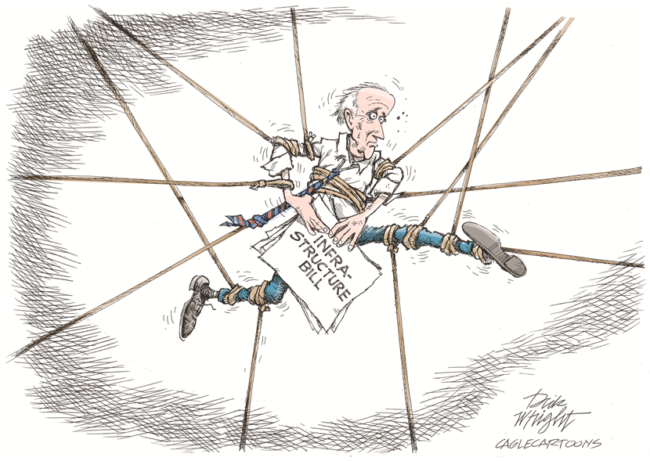
by Carl Golden
In their zeal to mollify the leftist progressive wing of their party, President Biden and the Democratic leadership in Congress have seriously jeopardized what was intended to be the Administration’s signature accomplishment – a $4 trillion infrastructure program, the largest national public works project since the New Deal.
Deep divisions between progressives, to whom bipartisanship is the equivalent of surrender, and moderates, who understand compromise is the only realistic path in a closely divided Congress, threatens to leave the President empty-handed.
It would be an embarrassing loss with long term implications.
Inadvertently or not, Biden contributed to the danger of defeat when he announced he’d reached an agreement with a bipartisan group of 10 Senators – 5 Democrats and 5 Republicans – on a $1.2 trillion infrastructure program, only to go off script and imply he’d veto the legislation if it was not accompanied by a far larger bill supported by the Democratic majority.
To no one’s surprise, the Republicans went into orbit, crying about standing with him in the White House driveway to announce the agreement only to be blindsided by the president conditioning his approval on linking the two bills.
Their threats to scuttle the entire deal reached a crescendo and, within 48 hours, Biden issued a retraction/explanation, saying he didn’t intend to raise the possibility of a veto and went on urge support for the larger Democratic approved bill.
That didn’t sit well with the progressives who, lined up behind Vermont Sen. Bernie Sanders, vow: “No reconciliation bill, no deal.”
Sanders has called for a program of up to $6 trillion – a figure dismissed by most as unrealistic – to provide, among other things, tax increases, a massive expansion of Medicare coverage, universal childcare, a permanent child tax credit, elements of the “Green New Deal,” and addressing climate change.
Senate Majority Leader Charles Schumer and House Speaker Nancy Pelosi both expressed their support for tying together the two proposals, despite all indications that the Democratic larger proposal would fail in the Senate.
Pelosi went so far as to pledge that should the bipartisan plan win Senate approval, she would refuse to schedule a House vote unless the Democratic plan was approved, a stance which places her in direct conflict with the president.
Senate Republican leader Mitch McConnell has called on Schumer and Pelosi to follow the president’s lead and keep the two proposals separate.
Normally a shrewd judge of the political environment, Pelosi, by taking such an unyielding stand, may have painted herself into a corner and risks being held responsible for the death of any infrastructure bill at all.
Sanders and his like-minded colleagues in the House have been dismissive of the bipartisan approach, attacking Republicans as less than serious and urging Biden to ditch trying to work across party lines and go it alone.
Senate Democrats intend to rely on a reconciliation process to bring their proposal to a vote, a maneuver which avoids reaching the 60-vote threshold to prevent a filibuster.
Even the prospect of securing the support of all 50 Democratic senators for reconciliation is dicey. West Virginia’s Joe Manchin, who’s emerged as the legislator with the greatest leverage in an evenly divided Senate, and Arizona’s Krysten Sinema have been adamant in their opposition to overturning the filibuster rule, potentially blocking any hope of approving the Democratic program.
The progressive bloc appears to have overlooked or purposely disregarded Biden’s 46-year history in public life in the Senate and as vice president, a career highlighted by compromise, consensus and bipartisan coalition building.
His quick retreat from a veto threat sent a message to Sanders and others that while he is willing to accommodate them on certain issues, there’s a limit to caving to the demands of a minority when it endangers the centerpiece of his domestic agenda.
Biden, sensing a major legislative triumph at hand, will use his power of persuasion to bring the vocal left to his point of view.
He’s dealing, though, with hardcore political ideologues, many of whom believe those with the largest number of Twitter followers hold the power. Their influence is largely a negative one; more about what they oppose than what they support and they are not the least bit reluctant to express their views in often coarse and personally offensive language.
For Biden, the finish line is in sight and he can’t afford to allow his own party to trip him on the way there.
Copyright 2021 Carl Golden, distributed exclusively by Cagle Cartoons newspaper syndicate. Carl Golden is a senior contributing analyst with the William J. Hughes Center for Public Policy at Stockton University in New Jersey. You can reach him at cgolden1937@gmail.
















